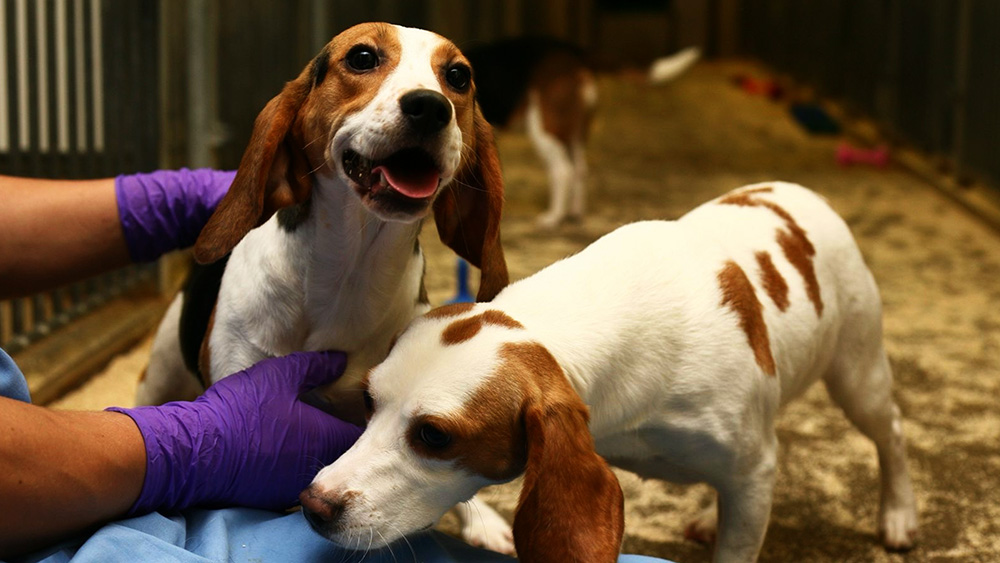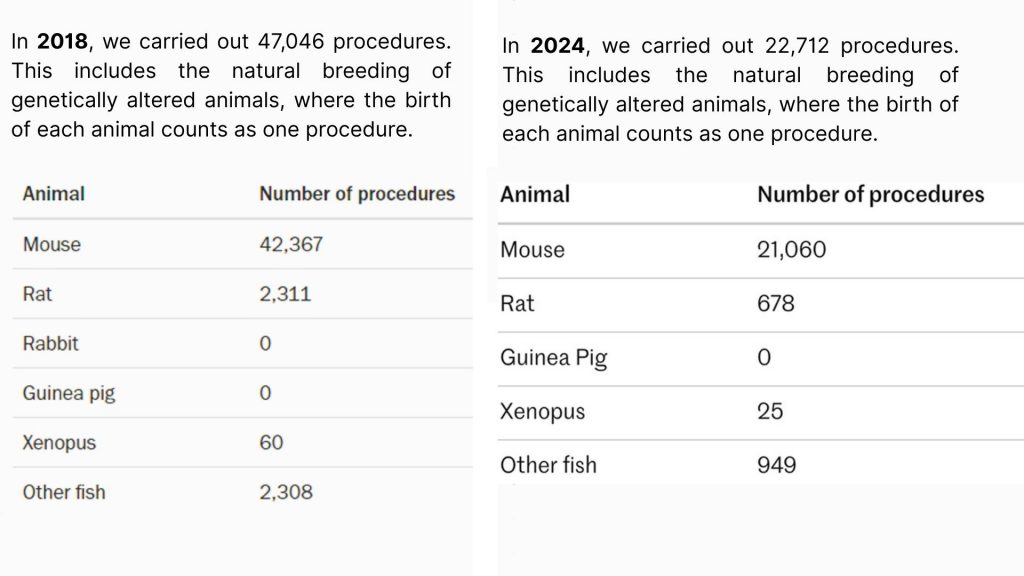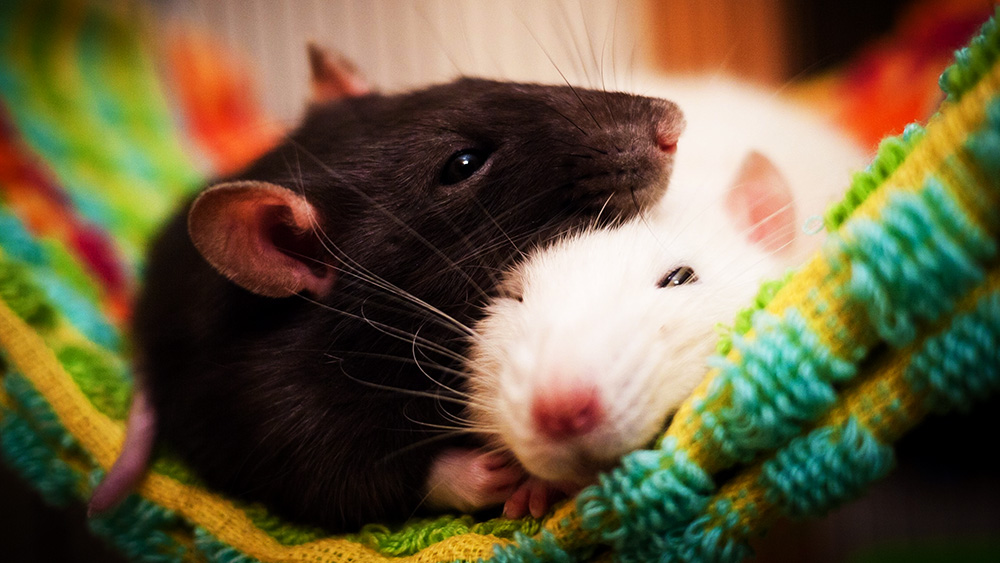A Welsh organisation believes that animal studies are ineffective for human medical research. Why do we still continue relying on animal experiments?

Rows of small cages lined the walls of a basement in southern China, each holding an animal in isolation. The iron pound barely allowed Echo, a white and brown beagle with flappy ears, to free his legs or raise his head.
He was one of the 25 laboratory animals used for tests who had spent the first six years of his life mostly confined in a cage. And a new drug test had made him go blind recently.
Echo represents millions of animals who continue to endure experiments in laboratories. However, Deborah Davies, one of the organisers of Wales Against Animal Experiment(WAAE), decided to take action to change the situation of animal experiments.
“Animals are sentient beings who experience fear and pain. Researchers often speak of their ‘sacrifice’ in the name of science,” Deborah says. “Using animals when the science is shown to be poor is ethically unacceptable, especially in light of the state-of-the-art human methodologies being developed.”
WAAE was set up by a small group of animal advocates, aiming to raise awareness and add Wales’s voice to the existing global anti-vivisection lobby. Last year, they launched a petition urging the Welsh Government to stop funding animal experiments.
Before expiring, it gathered 12,250 online signatures, with an additional 1,681 collected manually. A formal debate will be considered as the petition exceeded the 10,000 signatures requirement set by the Senedd.

“We were delighted that our recent petition asking the Welsh Govt to stop funding animal experiments attracted just under 14,000 signatures,” Deborah says. “We have contacted all members of the Senedd and written personally to certain MSs identified as having an interest in animal concerns, such as membership in the Cross Party Group on Animal Welfare.”
Deborah told Intercardiff that they are now focusing on responding to the Deputy First Minister’s comments on the anti-animal tests petition. This response will be discussed along with the Deputy First Minister’s views at the next Senedd Petition Committee on 28th April.
Wales’ animal experimentation dates back to the mid-20th century, primarily centred around higher education and research institutions. While it is difficult to say with certainty which is the first, research suggests Cardiff University may be the first institution to conduct formal scientific research involving animals.
Cardiff University is one of four Welsh universities [Aberystwyth, Bangor, Cardiff and Swansea] in the spotlight for using animals for tests. According to Cardiff University’s official website, it claims that research is crucial and necessary for developing treatments that benefit both humans and animals.

In 2018, Cardiff University’s website revealed it carried out 47,046 animal procedures. However, the number dropped to 22,712 in 2024, which represents a half decrease over 6 years.
This improvement is not only confined to the research institutions but to Wales as a whole. According to the latest UK government statistics, approximately 32,000 animal testing procedures were conducted in Wales in 2023, marking a 19% decrease from the previous year.
Across Great Britain, a total of 2.68 million scientific procedures were carried out on animals in 2023, which marked the lowest national figure since 2001.

But activists argue that there is still a long way to go.
WAAE is the tip of the iceberg in the fight against animal testing in the UK. Numerous campaigners and organisations’ efforts, including Animal Aid, Animal Free Research UK, Safer Medicines and Replacing Animal Research, are one important factor in driving down the data.
“Wales Against Animal Experiments is a member of the recently formed Alliance for Cruelty-Free Science,” Deborah says. “We are also involved with the FEAT [Finally Ending Animal Testing] campaign and are happy to collaborate with other groups as ‘together we are stronger’.
24th April is being marked as World Day for Animals in Laboratories. Many animal-protecting organisations have launched and involved FEAT to share information with the public and raise awareness about the use of animals in scientific research.
Since the early 2000s, especially following updates to the UK’s Animals (Scientific Procedures) Act, animal experiments have continued in Wales under tighter regulations.
Over the years, with the rise of genetic engineering technologies, some Welsh institutions have begun using genetically modified animals to model human diseases, raising new ethical concerns.
A YouGov poll shows that 8 out of 10 adults living in Wales think it is unacceptable to use animals for experiments and people in Wales favour alternative technologies over animal research.
Dr Andre Menache is an expert on medical research methods who argues that new technologies can replace animal experiments.
He suggests that many drugs that appear safe and effective in animal tests fail during human clinical trials.

“Dogs, rats, and monkeys are about as predictive as tossing a coin,” Dr. Andre says. “The liver on a chip is way more predictive of detecting and identifying prescription drugs that will cause damage to people’s livers than animals.”
Dr Menache and Deborah both believe that alternatives like organ-on-a-chip and 3D bioprinting technology are more promising solutions to the ethical and scientific concerns associated with animal testing. It allows researchers to study drug toxicity more reliably without causing harm to animals.
“Animal experiments are not only unethical but outdated,” Deborah says. “21st-century cutting-edge technologies based on human biology and data are far more predictive than animal models.”
